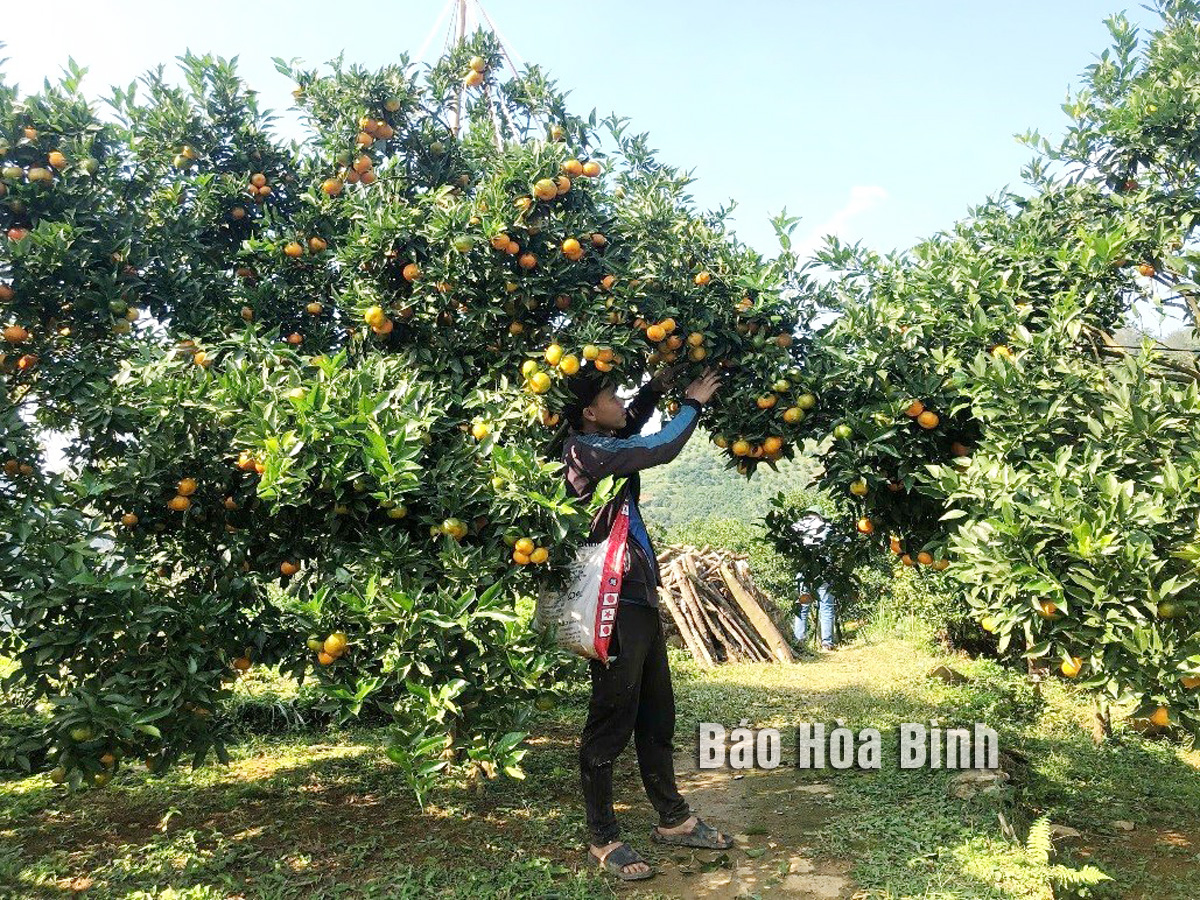



The members of the professional farmers’ group specializing in mandarin-orange cultivation in Xom Hamlet, Van Son Commune (Tan Lac), takingcare of their fruit orchard.
The Farmers’ Union of Tan Lac district has actively implemented Resolution No. 04-NQ/TW of the Central Farmers’ Union. They have vigorously promoted, guided and supported the local people in establishing cooperative models. These models act as a "common home” for Muong Bi farmers with shared occupations and aspirations, enabling them to overcome difficulties together and improve the efficiency of their production and business operations to have more prosperous lives.
Once a particularly disadvantaged commune in the district, Van Son is now adorned with the lush green of citrus orchards. Mr. Bui Văn Cuong, a farmer from Xom Hamlet, said that when the commune’s Farmers’ Union encouraged him to join the local mandarin-orange cultivating professional group, he boldly gave it a try. By sharing experiences and applying the advanced farming techniques, his mandarin-orange orchard began producing high yields and good quality fruit. Each annual harvest brings in 300 - 400 million VND (after expenses), a figure he once couldn’t have dreamed of just a few years ago.
In Bac Thung Hamlet, Quyet Chien Commune, the story of goat farming is also opening new chapters in the prosperous lives of Muong ethnic people. Mr. Bui Van Luong stands out as a prime example of transformation through the professional group model. Before 2018, his family raised goats on a small scale using traditional methods, which yielded low economic returns and posed high risks. "That year, I was encouraged by the commune’s Farmers’ Union to join the local professional goat-farming group. Starting with 12 goats, I spent years learning and applying knowledge about breeding techniques and disease prevention. Now, my herd has grown to 36 healthy goats,” said Mr. Lương. Using a staggered selling method, he ensures that goats reach an ideal weight of 25–30 kg before selling at a stable price of 120,000–140,000 VND/kg. The income from goat farming has improved his family’s living standards, enabling his children to attend school fully.
Thanks to its clear and sustainable economic benefits, the model of goat-farming professional group is attracting more and more local farmers. It not only boosts the income but it also provides a new approach, changing the outdated thinking and methods, thereby it has been effectively contributing to poverty reduction among the ethnic communities.
Mr. Bui Van Thong, the Vice Chairman of the Farmers’ Union in Quyet Chien commune, says: "In the initial stages, the associations and groups have demonstrated clear effectiveness, creating strong bonds among the members who share common interests under one professional roof and grow together. These groups not only serve as production units but they also act as ‘classrooms without blackboards’ for the local people, who have collaboratively built the operational regulations suited to their specific production conditions.”
Every month, under the direction and guidance of the bodies of the district-level Farmers’ Union, these associations and groups hold meetings covering a wide range of topics. These include sharing weather and crop information, lively roundtable discussions on local agricultural markets and prices, and strategies for accessing new sales channels. Of particular value are the "on-site classes" on new plant and animal varieties and the application of modern agricultural technologies, presented in simple, relatable language for the ethnic minority farmers. These gatherings foster stronger bonds among the members and offer opportunities for sharing experiences and improving production and business efficiency. Having a shared voice and standardized practices also makes it easier for their products to reach larger markets and avoid previous issues like price suppression.
In Tan Lac district, there have been 72 active professional associations and groups spanning various industries so far. The establishment of these professional groups by the district's Farmers’ Union has brought practical benefits, significantly improving the livelihoods of the ethnic minority members in the region.